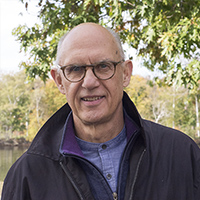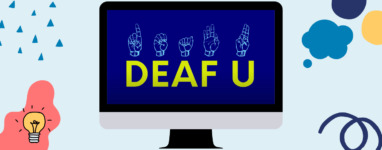Faces Behind the Screen: Stu
Updated: June 3, 2019
Imagine that a famous musician like Miles Davis, Joni Mitchell, or John Lennon had suddenly lost their hearing early in their careers. How would they be able to make music if they couldn’t hear themselves or their band playing or singing? Would they ever play music again or would we just live in a world without the Beatles?
These are the questions one might ponder after meeting someone like Stu, a successful musician who suddenly lost his hearing in the late 1970s and had to abandon his musical pursuits:
I had two records in the top 100 on the charts, and I had a number one record in Brazil.
And I was singing radio and television jingles in New York City, did some writing for Disney, and then, boom, boom… over the course of a year and a half. No music for 35 years.
What Stu meant by “boom, boom” is that he lost hearing in both ears, one after the other.
Stu, who we met during the New England ‘Walk4Hearing’ in the fall of 2016, experienced a condition called “sudden sensorineural hearing loss” while just starting what seemed like a promising career in the music business during the 1970s.
Sensorineural hearing loss, or SNHL, is generally permanent and is the most commonly reported form of hearing loss. SNHL can result from a genetic anomaly or an outside factor like noise trauma and infection.
In Stu’s case, his hearing loss was sudden and gradually worsened, eventually affecting both ears. Unfortunately, the treatment regimen and associated technology of the time were what today we would consider relatively primitive:
I was in the recording studio doing a jingle commercial with a group, and I suddenly could not hear very well on one side. And when you’re in the studio, you’re wearing headphones and you’ve got your own voice in one side and the rest [on the other side]. I was losing that and people were beginning to notice I was losing pitch.
So, it was then that I went home, that day or soon after, and stood up off the bed, and suddenly an air horn, like on a boat, went off in the left ear. It was probably a blood vessel bursting.
“ …They gave me steroids and that was it. Got into a hearing aid and I lived like that for the last 35 years. Different technology [back then].”
A year and a half later, the same thing occurred in Stu’s right ear and he went in for treatment:
…They gave me steroids and that was it. Got into a hearing aid and I lived like that for the last 35 years. Different technology [back then].
But as technology advanced and medical science began to approach hearing loss differently, things began to turn around for Stu:
What they discovered is that the brain hears, not the ears. So, my ears are just like they were 40 years ago, but my brain is able to hear more and I’m able to make more sense out of it. I’m able to sing and play and perform again, so it’s quite amazing.
Three years ago, Stu discovered a way to improve his hearing. He started working with Geoff Plant, speech specialist and president of the Hearing Rehabilitation Foundation in Somerville, MA. Through a series of focused listening exercises, Geoff helped Stu to better comprehend other people’s speech.
At the same time, hearing aid technology has come a long way:
Hearing aid technology has started to open up the frequency, so we’re able to hear a broader range of frequencies than we could with earlier hearing aids that were focused only on speech. So, now I was suddenly able to hear musical tones I hadn’t heard in a very long period of time.
Equipped with better hearing technology and speech comprehension, Stu was determined to revive his musical ambitions and decided to take voice lessons:
The [other] thing was vocal lessons– going back to take voice lessons and understanding how hearing was very much internal.
…And doing exercises, vocalizing, and breathing exercises, has really helped to coordinate my hearing with my voice and everything else in a way that I never expected.
“ A year ago this weekend, I started performing live again for the first time in 35 years.”
Incredibly, Stu is now picking up where he left off 40 years ago:
A year ago this weekend, I started performing live again for the first time in 35 years. And I’m about to go into the studio to record new music for the first time in 40 years in several weeks, so it’s very exciting.
…I’m working on new music to try to re-emerge musically in that world.
On the side, Stu works as a speaker, talking in front of audiences interested in his powerful life-story of living with and gradually learning to overcome hearing loss. Stu also works as a blog writer for both a travel company and a hearing aid company. Emerging hearing aid technology is one of his stronger interests, especially since developments in that industry have had a direct and positive impact on his life. Stu says he’s always trying new things when it comes to balancing the hearing aid technology with conventional studio recording techniques:
The digital technology has come in …and in many ways it’s terrific. But, there are experts in music who are saying that the old analog hearing aids are actually better to hear music with than some of the new digital hearing aids. So, I’m experimenting with all of them.
I just had a set of ear monitors made from a company called Sensaphonics in Chicago. The right ear monitor is a hearing aid and the left is called the CROS.
…I can’t wear a set of headphones in the studio because my hearing is too dull. With the monitors, it boosts the volume. I’m able to hear, sing into the microphone, and record as well.
Dave Matthews and a lot of artists are starting to use that on stage because they’re no longer using loud monitors and speakers, because that’s what blew everybody’s hearing out. When you’ve got ear monitors, you’re able to control what it is you’re hearing rather than the whole band.
So, Dave Matthews might say, give me a little guitar, give me a little piano and drum. That’s all I want. I don’t want anything else in there.
He adds that although hearing aid technology is better today than it ever has been, his experience with hearing rehabilitation has had the most profound impact on his hearing and his ability to make music. It has taught his brain to hear more through “listening more,” or actively looking for and identifying a speaker’s visual and aural cues such as lip movement and common sounds associated with certain words. This process can effectively retrain the brain to experience hearing with the aid of one’s vision and cognition. Hearing rehabilitation can also be used to help adults avoid dementia, as hearing loss can render certain parts of the brain dormant.
“ Being visible again is really a wonderful thing…”
Talking with Stu, it’s very evident how big of an impact hearing aid technology and medical advances in the understanding of hearing have had to make him such a passionate expert on those subjects. Stu also used to be an actor, and it seems his renewed relationship with hearing and music has motivated him to revisit another part of his old life, too:
I’m also an actor. And I’ve been in movies and other things, too. And I let that go many years ago, and I may pick that back up again and start getting it. Being visible again is really a wonderful thing, and being able to function.
Stu’s a big advocate of keeping one’s head up when dealing with hearing loss, and embracing the community and resources of others in the hard of hearing (HOH) community which is thriving today as evidenced by the hundreds of people around us who turned up at the Walk4Hearing:
I think that it’s very important, too, for us with hearing loss, that we all learn eventually that a lot of people have our problem — it’s not just us — and that there is strength in solidarity in the hearing loss community…
We’re not just some disabled group that’s off in the corner here. We all have lives. And it’s been wonderful. It’s wonderful to be here today at the Walk4Hearing to hear everything that’s going on and see people that are supporting that.
Some of the toughest situations for people are those people that live with us that have hearing loss– parents that have children that are born with hearing loss, or adults that suddenly lose their hearing and the kids can’t communicate with them. So I’m grateful for whatever we have right now.
“ We’re not just some disabled group that’s off in the corner here. We all have lives.”
We finished our conversation with a common, open-ended question we ask interviewees: Do you have any advice?
First, he explained, if you experience a sudden hearing loss, seek immediate medical attention. Like a stroke, if the condition isn’t treated quickly, you will lose more of your hearing until it’s gone.
He also added that people must remember: hearing loss is not “the end of the story.” Just like a broken leg can be ameliorated with physical therapy, hearing and oral rehabilitation works. (He personally recommends Geoff Plant for people in the Greater Boston area, but suggests looking for one wherever you live).
But here’s some advice you may not have heard before:
I also tell people with hearing loss to sing. One of the things that often happens to us is we lose music. It’s gone or it’s discombobulated, and we can’t understand it. Or we can only understand the music that we remember. Or there are certain tones and frequencies we get, but we don’t get the others.
What I’ve learned through oral rehab is that a lot of that stuff you can get back because of the brain. Not because your hearing is going to improve, but because the brain is going to be able to help you fill in the gaps. It’s almost kind of like virtual hearing that the brain allows you to do.
Maybe even get a vocal coach — because singing gets music back into the body. We know that we listen to music now for emotional reasons and psychological reasons. And I didn’t listen to music for years. I just started in the last year listening to music again, even music that I didn’t know. And the emotional resonance it gave me is a whole other thing.
But singing is even better. Plus, it also stimulates the upper part of the head — the ears and everything else. Sing in the shower.
…For people with hearing loss, that dullness when you take your hearing aid out is tough. Sing with your hearing aid out. Listen with your hearing aid out. And just listen to what you can.
Stu told us to keep in touch, left to change his hearing aid battery, and then got up on stage to sing the national anthem in front of the crowd.
—
Thank you to the Hearing Loss Association of America (HLAA) for hosting this series of interviews at the New England Walk4Hearing.





